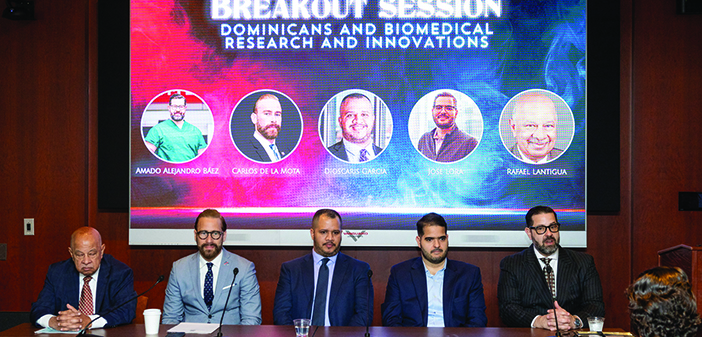At a Capitol Hill event, a med school professor addresses barriers and presents pathways to more representation in biomedical research.
Prominent Dominican Americans from across the country, including a member of the Medical School faculty, gathered in Washington, DC, in February to celebrate the achievements of the diaspora in the US.
Dioscaris Garcia PhD’12, assistant dean for diversity, equity, and inclusion and assistant professor of orthopaedics (research), was invited to participate in a panel discussion on how to grow the influence of Dominican Americans in biomedical research at the sixth annual Dominicans on the Hill. The event is organized by US Rep. Adriano Espaillat, D-NY, the first Dominican American to serve in the US House.
Among other topics, Garcia’s panel explored barriers to higher education and careers in scientific research.
“A lot of the next generation, by virtue of there having been so few of us in these scientific spaces, simply do not know how to get started or try to get where we are in our careers,” Garcia says.
Garcia knows these challenges personally. Since becoming one of Brown’s first Dominican American faculty members nearly a decade ago, he has mentored hundreds of students in the Diane N. Weiss Center for Orthopaedic Trauma Research and as the director of the Office of Belonging, Equity, Diversity and Inclusion’s Center for Student Belonging. He has experienced the difficulties that come with lacking a support group, particularly when he became a molecular pharmacology and physiology doctoral student.
“Even when I was accepted to Brown, I found myself asking, ‘Where was everybody else?’” Garcia says, referring to the lack of people of color in his program.
Being one of the only people of color in a setting is a lonely experience, Garcia says. Without direct mentorship and support groups, underrepresented students may not receive proper advice and guidance for things like research projects, grants, and curricula.
“We simply just don’t know, and the thing is, nobody tells us,” he says. “But we are expected to know all of these things and expected to carry on with our efforts.”
Garcia considers his participation in Dominicans on the Hill to be a continuation of his work at Brown. He has led dozens of initiatives to improve visibility and encourage participation by underrepresented students, including local high school students.
“I want to ensure that as we are looking at a growing and diverse population, that they have the ability to truly connect to the University,” Garcia says.
The importance of being “seen” also carries into some of the more technical sides of academia, he says. While peer groups exist to help students understand the intricacies of establishing and funding research, underrepresented populations facing cultural differences may not have the same access to support.
“For example, as a researcher, we say that one has to conduct a path of research and you’ll get funding—but that’s not really the case,” he says. Learning grantsmanship and networking with peers assume that a support group is already in place. Many underrepresented students simply don’t have that level of access, or even exposure, particularly young people aiming to break into scientific fields.
“This isn’t just about being Dominican, it’s about being a minority in these spaces,” Garcia says. “We know there is a massive revolving door not only in recruitment but in retention of individuals of color. It’s not because we’re not bright or not hardworking, it’s because there’s quite a bit that needs to be addressed in these environments.”
Garcia says addressing gaps in earning can greatly assist students. Many underrepresented students come from low-income households, which limits their ability to seek out internships and other opportunities. Brown offers internships and free summer programs for local underrepresented or low-income students that can remove this barrier.
His latest initiative, the Department of Orthopaedic Research Summer Academic Leadership (DORSAL), aims to build a pipeline of local inner-city students into the field of orthopedics through a fully paid internship. Garcia is also working to expand INDEX-Salud, a network of Dominican American biomedical and biotech leaders designed to strengthen the ties between the diaspora and the general public.
“Events like Dominicans on the Hill not only celebrate the achievements of Dominicans and other underrepresented groups in biomedical science, they open doors for others to follow,” Garcia says. While Rhode Island has one of the largest Dominican populations in the US, it has very few Latino physicians and scientists, and fewer still remain here after graduating. Garcia says these initiatives can help create a blueprint to strengthen both participation and equity.
“When I go to speak at these panels, my aim is to ensure I am not the last,” he says. “I want to continue my mission of providing a far easier path for those who are following me in my career.”




